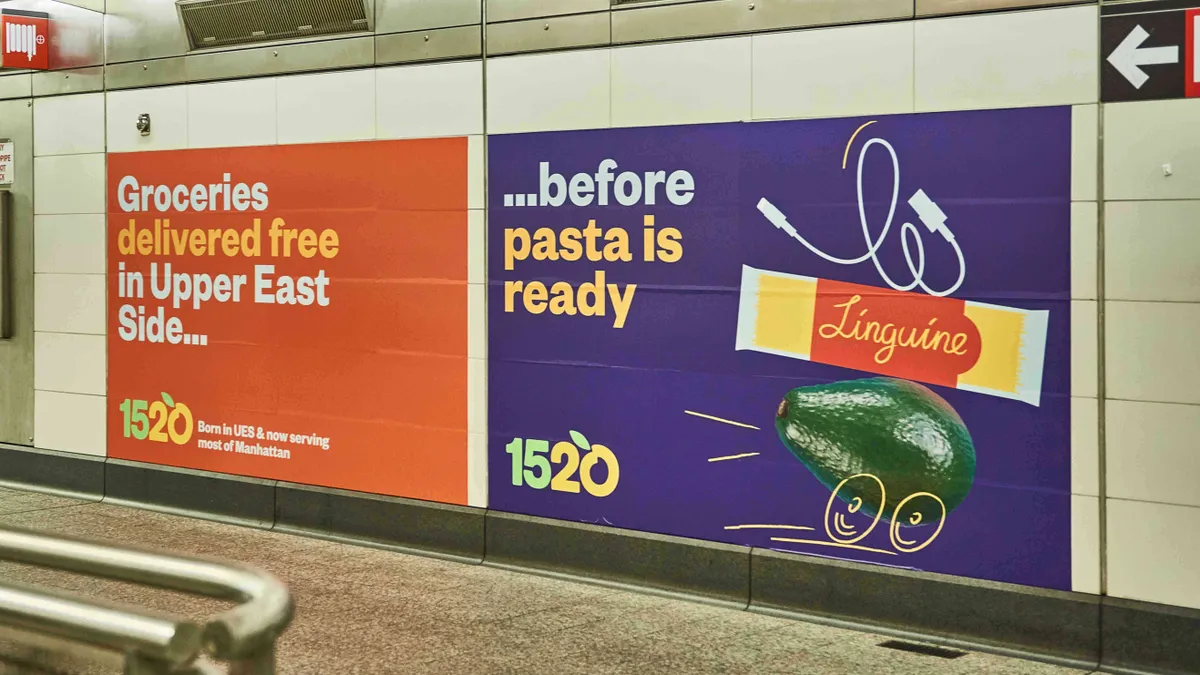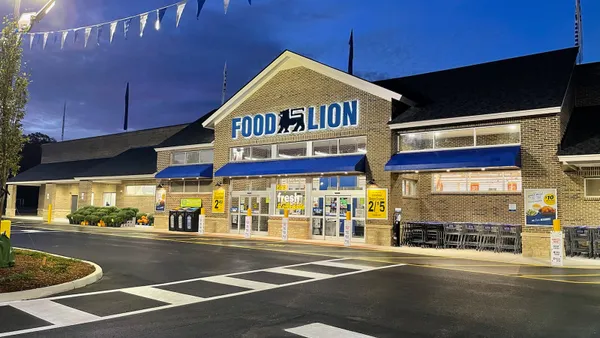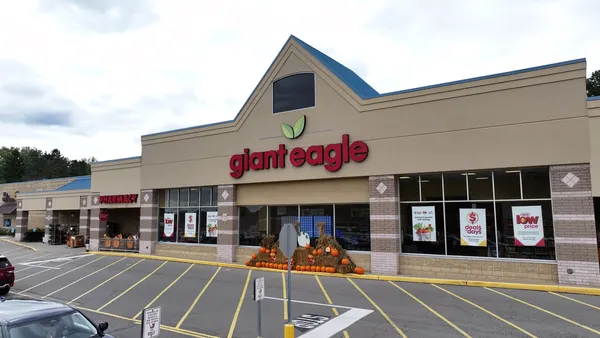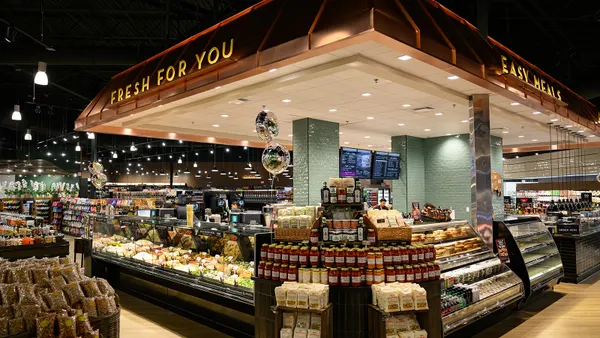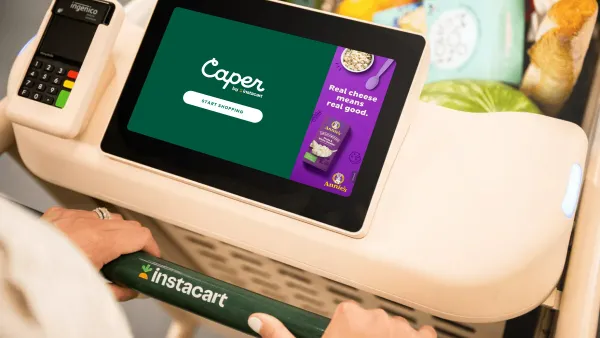Less than a year after jumping onto the fledgling instant grocery delivery scene in New York City, the founders of 1520 like what they see.
The company has steadily expanded its coverage of the nation's largest city since beginning operations at the start of 2021, helped by a high-profile ad campaign on the city's streets and subway system. And while 1520 faces formidable competition from brick-and-mortar competitors and instant delivery players like Jokr, Gorillas and Fridge No More — not to mention a no-fees, no-minimums operating model that experts have called into question — the online grocery company is confident its approach to food retailing will bear fruit after seeing encouraging early interest from customers.
"For now, we don't have the level of scale, brand recognition and negotiation power that established retail chains do, but even with the current gross margins, the economics work," said Maria Daniltceva, one of the company's four co-founders. "We won't [be a substitute] for Whole Foods or the huge retail chains which are around New York, but it's just a new way of doing grocery shopping."
Launched in January with a single dark store on East 86th Street and a fleet of electric bikes serving Manhattan's Upper East Side neighborhood, 1520 has since expanded to other parts of the city, including the Upper West Side, Midtown, Gramercy and SoHo, Daniltceva said. Wherever it operates, the company promises to deliver orders within 20 minutes or provide a refund.
1520, which was bootstrapped by its founders before scoring $7.8 million in seed funding from Greycroft, One Way Ventures and Flint Capital in April, also operates in Long Island City, part of the New York borough of Queens, and announced in August that it had started service in Astoria, another Queens neighborhood. The company said last month that it had started offering prepared foods like sandwiches, salads and wraps, which it obtains from a supplier in Queens.
According to Daniltceva, 1520 plans to soon begin service in New Jersey in Hoboken and Jersey City, just across the Hudson River from Manhattan, and is looking to expand to other U.S. cities. While she would not identify the cities 1520 is eyeing, the company's Instagram account indicates it is planning to begin service in Chicago "soon."
Daniltceva, who met 1520 CEO and co-founder Oleg Shevlyagin when both were working at management consulting firm McKinsey & Company in Moscow, talked with Grocery Dive about the e-commerce company's efforts to build its business.
This interview has been edited for length and clarity.
GROCERY DIVE: Since 1520 doesn't have a minimum order requirement or charge a delivery fee, and you don't have the purchasing power of a large grocer, what's your strategy for making money?
MARIA DANILTCEVA: We are super-efficient. Don't forget about the fact that traditional grocery retail chains invest a lot in their spaces. We have considerably lower rents and small spaces, so we save a lot on that.
Also, people do not usually shop for snacks or sweets with us. Eighty-five percent of our orders have produce or dairy, and these are things that young families or young professionals shop for. And that brings the basket to a size that is more than enough for the economics to work.
You said you're pleased with customers' response to what you offer so far. What does your typical basket look like?
The average order has around eight different items, so it's easy to carry on an e-bike. Sometimes we do get very large orders, but we can trust the delivery guys to get it to the client, so there are no constraints on order size.
Of course, there are funny orders, like at 9 p.m. when people are craving sweets and just order one pint of ice cream. But for the majority of times, I would say people feel like if someone will come to their place to deliver, they're not just going to order one item. So they say, "I came for avocados, but I'm going to add some tomatoes, arugula and milk."
What convinced you to launch your company even before knowing if investors would be interested in putting funds into another instant-delivery business?
Our CEO, Oleg Shevlyagin, used to work for [Russian internet company] Yandex on this exact same kind of service, so he knew how to do this operationally. And we're super lucky to have found people that have experience at [food retailers] like Whole Foods and Citarella. But we wanted to test the average order value to understand whether the economics could work and whether it made sense to actually raise money.
It turned out that the average order value was super healthy, and we're super happy about that. But it's a capital-intensive business since you need to sign leases and you need to store the inventory, so in a couple of months, we're going to raise money again.
What's your strategy for deciding which products to carry, and to what extent are you pointing to your assortment as a differentiator?
We really love to support local brands without having that established a brand name of our own yet, so if a company has a high-quality product, we are happy to be a platform and a distribution channel for them.
Sometimes clients reach out to us saying, "I really love shopping with you, but can we please have this or that?" We are really responsive to our clients' feedback, because at the end of the day, it's our job to serve them. And favorite local brands like Levain ice cream are some of our top-selling SKUs.
How large are your dark stores, and how many products are you able to fit into those spaces?
Our dark stores are between 1,500 and 2,000 square feet. For now we have around 1,500 SKUs, and we are working on improving that. Our target is at some point to have 3,000 SKUs.
We won't have everything that you can find in the biggest retail chains, but we think you need to limit the choice for clients to help them shop on the app. So 3,000 SKUs is more than enough for this kind of on-demand service.
How would you describe the way your dark stores are designed?
They're like a regular grocery store, but very, very dense, and since we don't spend money on a nice retail front and stuff, they're really warehouses. We rent the space and build a walk-in cooler, so we have a room which is a cooler, which is super nice and super efficient in terms of energy consumption. We also have freezers for ice cream, pizza and other frozen stuff, and space for shelf-stable stuff.
Does 1520 use contractors to pack orders and manage deliveries, or are you building your own workforce?
Our delivery guys are employed by 1520, and they either come with their own e-bikes or we provide bikes to them. We do everything in-house, so it's a big enabler of our business.
How many delivery personnel does 1520 have at this point?
I would say it's around 10 people per location for now, but obviously it's going to run up a lot with the scale because we are growing week over week at a very fast pace.



